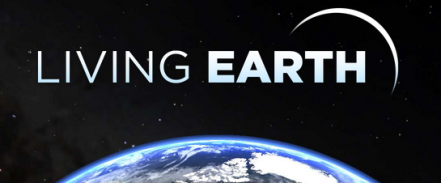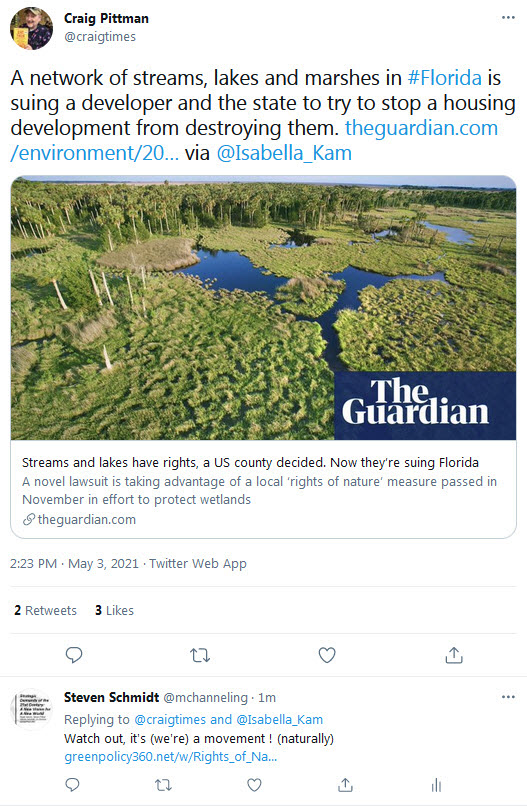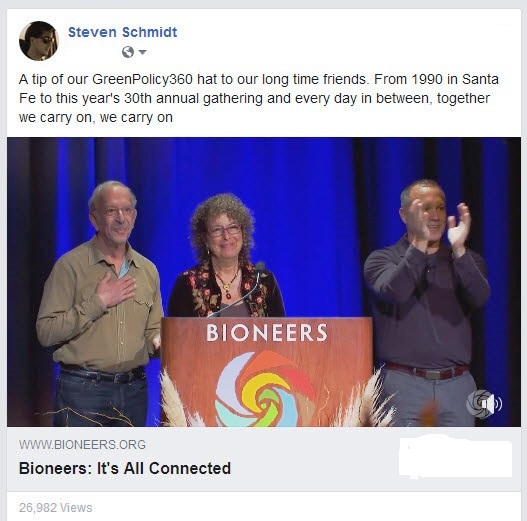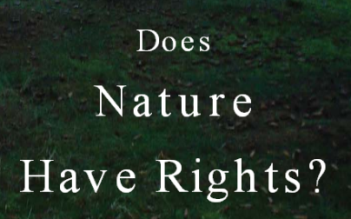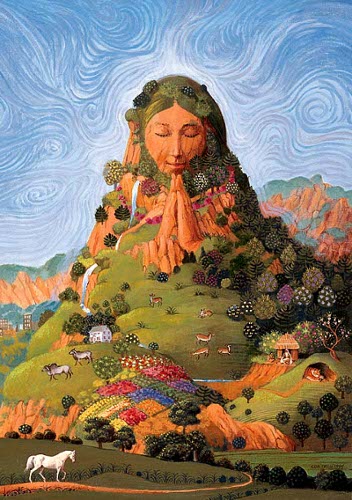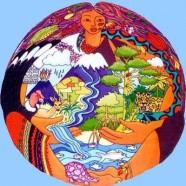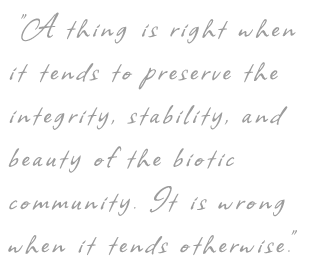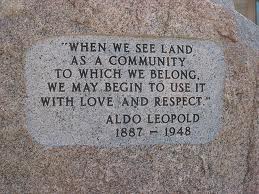Rights of Nature EarthLaw: Difference between revisions
Siterunner (talk | contribs) No edit summary |
Siterunner (talk | contribs) No edit summary |
||
| (51 intermediate revisions by the same user not shown) | |||
| Line 1: | Line 1: | ||
'''Rights of Nature, EarthLaw, & a Living Earth''' | |||
[ | [[File:Living Earth.png]] | ||
<big><big>'''[[Planet Citizen Vision of Living Earth]]'''</big></big> | |||
* https://www.greenpolicy360.net/w/Planet_Citizen_Vision_of_Living_Earth | |||
[http://celdf.org/rights-of-nature- | <big><big>'''A Thousand Miles in the Amazon, to Change the Way the World Works'''</big></big> | ||
Lawyers and justice advocates, fresh evidence and testimony in Indigenous communities and sustainable villages, and new theory of law aimed at recognizing the rights of nature | |||
Via Inside Climate News / October 2022 | |||
* https://insideclimatenews.org/news/09102022/a-thousand-miles-in-the-amazon-to-change-the-way-the-world-works/ | |||
''They had come under the banner of the International Rights of Nature Tribunal, promoting a legal movement based on the premise that nature—forests and rivers and wild animals and ecosystems—has inherent legal rights to exist and regenerate, just as humans possess human rights by virtue of their existence.'' | |||
''And so these lawyers and justice advocates assembled one hot night in July at a wooden country home down a long red dirt road 30 minutes outside Altamira to hear an audacious case: The Amazon, “a living entity under threat.”'' | |||
''They would meet with Indigenous people and traditional communities whose intimate relationships with the Amazon allowed them to speak on the forest’s behalf. They would ask questions no one else was really asking, and listen the way no one else was really listening, hoping to change the way the world works...'' | |||
''Cormac Cullinan is now best known as the author of “Wild Law,” a seminal 2002 book championing the rights of nature that has since made him a leading light in that movement. He is the founder of Cape Town’s oldest environmental law firm and spends most of his time defending the rights of local communities and fighting environmentally destructive projects by invoking conventional environmental protection laws...'' | |||
''For Cullinan, laws around the world are based on a flawed logic that became popular during the Industrial Revolution, perhaps best characterized by Francis Bacon’s late-16th-century notion that nature should be “tortured” or “put on the rack” to reveal her secrets. That logic assumes that human beings are separate from and superior to nature. But modern science disproves that idea. Quantum physics shows that the universe is a singular whole composed of many interconnected parts, and Cullinan often compares humanity to one leaf on a tree of life. Still, legal systems remain mired in thinking like Bacon’s, and that, he says, has led to the world’s growing ecological peril...'' | |||
''As Cullinan listened to people talk of harms suffered in small communities and villages, he heard them describing global forces. It wasn’t just Jair Bolsonaro, Brazil’s right-wing president, making it easier for illegal miners, loggers and poachers to operate in the jungle by scaling back the enforcement of environmental protection laws. There were even larger forces at play. Megadams and mines had been pushed through and supported by politicians across the political spectrum in Brazil. And national and international legal systems were not just allowing the erosion of the Amazon to happen—they were facilitating it.'' | |||
''“I became a rights of nature activist and a judge with the tribunal because I realized that we cannot solve the problems that we face with environmental law, because the legal systems as a whole are part of the problem,” he told the group. Those systems view the forest as a collection of natural resources for human exploitation. “That is not the perspective of this tribunal,” he said.'' | |||
''Felicio Pontes Jr., a Brazilian federal prosecutor, tells his fellow judges about the successive development projects along the Xingu River that are affecting human and non-human life along the river.'' | |||
''Pontes, after a long career as a prosecutor, understood the connection between people living in the forest and the well-being of nature: Today in Brazil, the most preserved forest lies on Indigenous land, with less than 1 percent stripped of its forests, compared with 20.6 percent on private land.'' | |||
''“The rights of nature need to be connected to the rights of the traditional communities who defend it,” Pontes said.'' | |||
... ''(It) was an encounter with the writings of the Catholic priest and cultural historian Thomas Berry that ignited (Cullinan's) understanding that nature possesses inherent rights to exist and regenerate.'' | |||
''Berry, a native of Greensboro, North Carolina, taught that humans are interconnected with all forms of life on Earth and that the universe is “a communion of subjects, not a collection of objects.” It was a radically different perspective of the world and, for Cullinan, an entry point for articulating Berry’s ideas within the realm of the law.'' | |||
''The deeper Cullinan went into Berry’s work, the more he realized that science backed up the ideas. Albert Einstein, for one, had written that human beings are “part of the whole called by us universe” but experience a “delusion” of separateness from other beings.'' | |||
''At 40, Cullinan, by then a well-known environmental lawyer, published “Wild Law.” A crucial work on the rights of nature, the book, with a foreword by Berry, expounds on a concept that Cullinan calls Earth Jurisprudence—a legal philosophy that requires that human-made laws be aligned with the laws of nature, like physics. Recognizing the rights of nature, Cullinan wrote, is a step toward achieving Earth Jurisprudence and Berry’s broader vision of humans living in harmony with nature.'' | |||
''His work and Berry’s are heavily influenced by the worldviews and teachings of Indigenous peoples and traditional communities around the world.'' | |||
''In 2006, just four years after “Wild Law” was published, a group of American lawyers took the ideas and crafted the first on-the-books rights of nature law, written into a rural Pennsylvania town’s municipal code. [https://celdf.org/rights-of-nature/ (See Tom Linzey/CELDF's 'Rights of Nature' work)] From there, the movement snowballed, culminating in Ecuador’s 2008 recognition of nature’s rights in its constitution. Today, at least 37 countries and numerous U.S. municipalities recognize the rights of nature in some form.'' | |||
''In 2010, Cullinan played a leading role in the Bolivian initiative to draft the Universal Declaration of the Rights of Mother Earth, a charter similar to the 1948 Universal Declaration of Human Rights. That year, Cullinan, the Ecuadorian activist Greene and others founded the Global Alliance for the Rights of Nature to unite organizations and individuals working on defending the rights of nature. The alliance embodies Cullinan’s own theory of change, which holds that systematic shifts happen when activists are able to form strong bonds across a wide range of communities and cultures—“like veins in a body,” he says.'' | |||
''Ana Carolina Alfinito, a Brazilian lawyer and judge on the International Rights of Nature Tribunal:'' | |||
''“All land here is virtually Indigenous land,” said Carolina, a tall, thin woman with short brown hair and an encyclopedic knowledge of Brazilian history. She now works for the nonprofit Amazon Watch, devoted to protecting the rainforest and Indigenous people’s rights, and has spent years working on land rights in the Amazon.'' | |||
Read the [https://insideclimatenews.org/news/09102022/a-thousand-miles-in-the-amazon-to-change-the-way-the-world-works/ '''full story by Katie Surma here'''] | |||
···························· | |||
More on the Rights of Nature story: | |||
'''''Wild Law: A Manifesto for Earth Justice''''' | |||
[https://www.abebooks.com/servlet/SearchResults?kn=wild%20law%20by%20cormac%20cullinan&sts=t&cm_sp=SearchF-_-topnav-_-Results Published – May 26, 2011'''] | |||
''by Cormac Cullinan'' | |||
''Wild Law fuses politics, legal theory, quantum physics and ancient wisdom into a fascinating story. It has been seminal in informing and inspiring the global movement to recognise rights for Nature – a movement destined to shape the twenty-first century as significantly as the human rights movements shaped the twentieth century. This revised edition includes a new preface, postscript and the Universal Declaration of the Rights of Mother Earth proclaimed on 22 April 2010.'' | |||
''Wild Law presents a vision of how we could transform the systems that structure and order industrialised societies to enable us to rediscover a viable role for our species within the Earth community. It reveals how the goverance systems of today legitimise and promote the disastrous expolitation and destruction of Earth. The author explains how to begin transforming these systems to ensure that the pursuit of human well-being enhances the beauty, health and diversity of Earth instead of diminishing it.'' | |||
''Wild Law describes an Earth-centred approach to ordering human societies (Earth jurisprudence), how to apply it, and it's emerging role as a common manifesto for promoting social and environmental justice, the conservation of biological and cultural diversity, animal rights and welfare, and green spirituality.'' | |||
'''''The Rights of Nature: A Legal Revolution That Could Save the World''''' | |||
[https://www.abebooks.com/servlet/SearchResults?kn=the%20rights%20of%20nature%20by%20david%20r%20boyd&sts=t&cm_sp=SearchF-_-topnav-_-Results Published - September 5, 2017] | |||
''by David R. Boyd | |||
* | |||
''Winner of the Green Prize for Sustainable Literature A growing body of law around the world supports the idea that humans are not the only species with rights; and if nature has rights, then humans have responsibilities. “Expertly written case studies in which legalese is accessibly distilled … empowering reminders that the seemingly inevitable slide toward planetary destruction can be halted.” ― Publishers Weekly, starred review Palila v Hawaii. New Zealand’s Te Urewera Act. Sierra Club v Disney. These legal phrases hardly sound like the makings of a revolution, but beyond the headlines portending environmental catastrophes, a movement of immense import has been building ― in courtrooms, legislatures, and communities across the globe. Cultures and laws are transforming to provide a powerful new approach to protecting the planet and the species with whom we share it. Lawyers from California to New York are fighting to gain legal rights for chimpanzees and killer whales, and lawmakers are ending the era of keeping these intelligent animals in captivity. In Hawaii and India, judges have recognized that endangered species ― from birds to lions ― have the legal right to exist. Around the world, more and more laws are being passed recognizing that ecosystems ― rivers, forests, mountains, and more ― have legally enforceable rights. And if nature has rights, then humans have responsibilities. In The Rights of Nature, noted environmental lawyer David Boyd tells this remarkable story, which is, at its heart, one of humans as a species finally growing up. Read this book and your world view will be altered forever.'' | |||
🌎 | |||
<big><big>''2021''</big></big> | |||
[[File:Florida rights of nature lawsuit - May 2021.jpg]] | |||
Via The Guardian | |||
May 2021 | |||
<big>'''''A network of streams, lakes and marshes in Florida is suing a developer and the state to try to stop a housing development from destroying them.'''''</big> | |||
* https://www.theguardian.com/environment/2021/may/01/florida-rights-of-nature-lawsuit-waterways-housing-development | |||
''The novel lawsuit was filed on Monday in Orange county on behalf of the waterways under a “rights of nature” law passed in November. It is the largest US municipality to adopt such a law to date.'' | |||
''The listed plaintiffs are Wilde Cypress Branch, Boggy Branch, Crosby Island Marsh, Lake Hart and Lake Mary Jane.'' | |||
''Laws protecting the rights of nature are growing throughout the world, from Ecuador to Uganda, and have been upheld in courts in India, Colombia and Bangladesh. But this is the first time anyone has tried to enforce them in the US.'' | |||
''The Orange county law secures the rights of its waterways to exist, to flow, to be protected against pollution and to maintain a healthy ecosystem. It also recognizes the authority of citizens to file enforcement actions on their behalf.'' | |||
''The suit, filed in the ninth judicial circuit court of Florida, claims a proposed 1,900-acre housing development by Beachline South Residential LLC would destroy more than 63 acres of wetlands and 33 acres of streams by filling and polluting them, as well as 18 acres of wetlands where stormwater detention ponds are being built....'' | |||
''Thomas Linzey, senior legal counsel at the Center for Democratic and Environmental Rights who helped secure Orange county’s rights of nature law last year, said: “Given the rampant development that’s occurred in Florida over the past 30 years, and the power struggle between the state government and local government over these issues, there are multiple grounds for a court to hold that the development cannot proceed as proposed.”'' (More below on work of Tom Linzey) | |||
''The center calculates that more than 9m acres of wetlands have been destroyed in Florida since it became a state in 1845. They say this has had profound impacts on water quality and species, as well as flood control.'' | |||
''The Florida department of environmental protection said it would not comment on pending litigation.'' | |||
○ | |||
'''''Thomas Linzey & Mari Margil – Occupy the Law: The Movement for Community Rights and the Rights of Nature''''' | |||
''As species collapse around the world while governments still authorize fossil fuel extraction and other destructive, unsustainable activities, communities across the U.S. are rising in resistance to “occupy the law”. They’re enacting “community bills of rights” that recognize a community’s legally enforceable right to sustainability and the rights of nature. Two of its most effective path-finding national and global leaders, Tom Linzey and Mari Margil of the Community Environmental Legal Defense Fund, show how this movement challenges our constitutional framework in which corporate rights and the preemptive authority of state and federal governments block sustainability, environmental protection and democracy.'' (2016) | |||
* https://bioneers.org/thomas-linzey-mari-margil-occupy-the-law-bioneers/ | |||
* https://conference.bioneers.org/speaker/thomas-linzey/ | |||
* https://bioneers.org/thomas-linzey-turning-defense-into-offense-bioneers/ | |||
'''''More about Rights of Nature at GreenPolicy360''''' | |||
* https://www.greenpolicy360.net/w/Rights_of_Nature_EarthLaw | |||
* https://www.greenpolicy360.net/w/Category:Earth_Law | |||
○ | |||
April 27th, 2021 | |||
'''First U.S. “Rights of Nature” Enforcement Case Filed''' | |||
''Florida Waterways Seek to Enforce Their Legal Right to “Exist” - Proposed Housing and Commercial Development Would Destroy Wetlands and Streams'' | |||
''Orange County, FL: On Monday, April 26, the first enforcement case in the United States was filed under a “rights of nature” law. The lawsuit was brought by waterways to enforce their legal rights against a developer’s proposal to destroy wetlands and streams.'' | |||
''The legal action was brought under a rights of nature law overwhelmingly adopted by voters in November 2020 in Orange County, Florida. Orange County, with nearly 1.5 million people, is the largest municipality in the U.S. to adopt a rights of nature law.'' | |||
''The Orange County law secures the rights of waterways to “exist, flow, be protected against pollution and maintain a healthy ecosystem.” The law further recognizes the authority of citizens to file enforcement actions on behalf of waterways, and directs courts to enjoin projects and activities that violate the rights of waterways.'' | |||
* https://www.centerforenvironmentalrights.org/news/first-us-rights-of-nature-enforcement-case-filed | |||
·············· | |||
<big><big>''2020''</big></big> | |||
'''''Seven Countries Recognize Rights of Nature''''' | |||
* https://matadornetwork.com/read/countries-legally-recognized-rights-nature/ | |||
<big><big>Rights of Nature at the Bioneers</big></big> | |||
* http://www.bioneers.org | |||
* https://www.greenpolicy360.net/w/Bioneers | |||
[[File:Bioneers It's all connected - 30th annual conference.jpg|link=https://www.facebook.com/Bioneers.org/videos/2197871260292334/]] | |||
''Rights of Nature is a global movement to protect nature (rivers, mountains, and entire ecosystems and the life forms supported within them) by recognizing its legal rights. Just as humans and corporations are considered to “have rights,” this legal strategy grants rights to nature itself. These frameworks turn the existing property rights-based paradigm upside down and offer a powerful basis and strategy to conserve lands and communities. They also offer a radically different worldview: the right of nature to exist, persist, flourish and evolve.'' | |||
''Rights of Nature legal frameworks could hold important keys to shifting the system and transforming the law from treating nature as property to a rights-bearing entity on whose behalf people have legal standing as trustees. Bioneers is partnering with a variety of Native allies and organizations to explore these alternative legal strategies to “occupy the law.” '' | |||
'''''Visit the Bioneers Rights of Nature Action Initiative''''' | |||
* https://bioneers.org/projects/rights-of-nature-legal-frameworks-in-indian-country/ | |||
''As Paul Hawken once said at the [https://bioneers.org/tag/bioneers-conference/ annual Bioneers conference], “The more corporations are in control, the more the world goes out of control.” That is the dilemma we all face. As to how to address that crisis, there are many paths. Bioneers believes Rights of Nature legal frameworks could hold important keys to shifting the system and transforming the law from treating nature as property to a rights-bearing entity on whose behalf people have legal standing as trustees...'' | |||
''More at:'' | |||
The Center for Democratic and Environmental Rights -- https://www.centerforenvironmentalrights.org | |||
(FB) https://www.facebook.com/centerforenvironmentalrights/ | |||
(TW) https://twitter.com/rightsofnature | |||
············ | |||
<big><big>''2019''</big></big> | |||
''In deep contrast to the “human vs. nature” dichotomy underpinning much Western thought, Indigenous Peoples share a worldview that humans are a part of nature’s interconnected systems. It’s not surprising that Indigenous Peoples are at the forefront of a growing movement to acknowledge the legal “Rights of Nature.”'' | |||
'''''Rights of Nature: A Movement''''' | |||
* https://www.theguardian.com/books/2019/nov/02/trees-have-rights-too-robert-macfarlane-on-the-new-laws-of-nature | |||
'''''Rights of Nature: Moving to Protect Rivers and Water in Florida''''' | |||
* https://www.orlandoweekly.com/Blogs/archives/2019/09/11/movement-grows-in-florida-to-preserve-nature-and-drinking-water-by-granting-legal-rights-to-rivers | |||
'''''Rights of Nature Constitutional Amendment Introduced in Swedish Parliament''''' | |||
* https://celdf.org/2019/10/media-release-rights-of-nature-constitutional-amendment-introduced-in-swedens-parliament/ | |||
············ | |||
<big><big>''2018''</big></big> | |||
:* [http://therightsofnature.org/ '''''Global Alliance for the Rights of Nature'''''] | |||
[http://www.naturensrattigheter.se/2018/05/29/the-sami-parliament-of-sweden-endorses-the-universal-declaration-of-rights-of-mother-earth/ <big>'''''The Sami Parliament of Sweden endorses the Universal Declaration of Rights of Mother Earth'''''</big>] | |||
''The Declaration includes the right of Mother Earth and her beings to life and existence, respect, to regenerate its biocapacity and to continue its vital cycles and processes free from human disruptions...'' | |||
''This is a very important decision, says Marie Persson Njajta. We wrote it for our children and the possibilities for coming generations to live a good life. We believe a paradigm shift is needed towards a view where humans understand ourselves as part of nature, which is the way indigenous people relate to nature. We, the Sami people, believe that we belong to the land, not the other way around.'' | |||
''The Declaration was first presented at the World People’s Conference on Climate Change in 2010.'' | |||
::[[File:Does Nature Have Rights.png]] | |||
::○ [http://en.wikipedia.org/wiki/Rights_of_Nature '''"Rights of Nature"'''] ○ [http://en.wikipedia.org/wiki/Law_of_the_Rights_of_Mother_Earth '''Rights of Earth'''] | |||
::○ [http://ncronline.org/blogs/eco-catholic/rights-nature-alliance-holds-ecuador-summit '''Rights of Nature Alliance holds Ecuador Summit'''] | |||
::[[File:La-Ley-de-la-Madre-Tierra.jpg]] | |||
''With the enactment of the its 2008 Constitution, '''Ecuador''' became the first country in the world to codify the Rights of Nature. Articles 10 and 71–74 of the Ecuadorian Constitution recognize the inalienable rights of ecosystems to exist and flourish, gives people the authority to petition on the behalf of ecosystems, and requires the government to remedy violations of these rights.'' | ''With the enactment of the its 2008 Constitution, '''Ecuador''' became the first country in the world to codify the Rights of Nature. Articles 10 and 71–74 of the Ecuadorian Constitution recognize the inalienable rights of ecosystems to exist and flourish, gives people the authority to petition on the behalf of ecosystems, and requires the government to remedy violations of these rights.'' | ||
'''"Ley de Derechos de La Madre Tierra"''' | |||
<big>'''''"Ley de Derechos de La Madre Tierra"'''''</big> | |||
'''''Bolivia passes''' [http://www.worldfuturefund.org/Projects/Indicators/motherearthbolivia.html "Law of Mother Earth"] | '''''Bolivia passes''' [http://www.worldfuturefund.org/Projects/Indicators/motherearthbolivia.html "Law of Mother Earth"] | ||
| Line 53: | Line 306: | ||
○ | |||
| Line 83: | Line 336: | ||
http://www.gaiafoundation.org/earth-law-precedents | http://www.gaiafoundation.org/earth-law-precedents | ||
······································································································· | |||
[http://www.un.org/apps/news/story.asp?NewsID=44723&Cr=environment&Cr1=#.VgGFBd9VhBd ''On Mother Earth Day 2013, UN Member States urge harmony with nature''] | |||
······································································································· | |||
<big>'''''News'''''</big> | |||
''The Nonhuman Rights Project - gaining common law rights for nonhuman animals through litigation'' | |||
http://www.nonhumanrightsproject.org/ | |||
: https://twitter.com/NonhumanRights | |||
○ | |||
[http://voices.nationalgeographic.com/2012/09/04/a-river-in-new-zealand-gets-a-legal-voice/ ''A River in New Zealand Gets a Legal Voice''] | |||
''More'' | |||
[http://therightsofnature.org/rights-of-nature-laws/whanganui-river-given-rights-as-a-legal-identity/ ''Whanganui River given rights as a legal identity''] | |||
''"Ko au te awa, Ko te awa ko au ~ I am the river and the river is me"'' | |||
[http://www.treehugger.com/environmental-policy/river-new-zealand-granted-legal-rights-person.html ''New Zealand river legal rights via Treehugger''] | |||
○ | |||
[http://www.theguardian.com/global-development-professionals-network/2015/aug/25/waterman-of-india-rajendra-singh-stockholm-water-prize ''Flowing rivers must be a human right, Stockholm Water Prize''] | |||
○ | |||
''On the intersection of environment and faith, Dr. Mary Evelyn Tucker, co-director of the Yale Forum on Religion and Ecology, [https://media.usfca.edu/Watch/c7G8Qtx4 explains]: “This [http://www.greenpolicy360.net/mw/images/Papa-francesco_20150524_enciclica-laudato-si_%281%29.pdf encyclical], and its statement on the intrinsic rights of nature, is a breath of fresh air. Efforts to tackle climate change and other environmental issues have been driven by science, policy, economics, technology, and law. But science and policy alone are not going to solve these problems. We need these larger values–religion, art, and philosophy.”'' | |||
* http://www.greenpolicy360.net/w/Integral_Ecology | |||
| Line 88: | Line 378: | ||
'''Rights of Nature''' | <big>'''''Rights of Nature'''''</big> | ||
'''Legal advocacy by the Community Environmental Legal Defense Fund''' | '''''Legal advocacy by the Community Environmental Legal Defense Fund''''' | ||
http://www.celdf.org/ | * http://www.celdf.org/ | ||
http://celdf.org/rights-of-nature-frequently-asked-questions | * https://celdf.org/rights/rights-of-nature/ | ||
* http://celdf.org/rights-of-nature-frequently-asked-questions | |||
''The Community Environmental Legal Defense Fund works with communities in the United States and in countries around the world on grassroots organizing, public education and outreach, research, and legislative drafting - assisting people, NGOs, elected representatives, and government officials to craft and adopt new laws that change the status of natural communities and ecosystems from being regarded as property under the law to being recognized as rights-bearing entities.'' | ''The Community Environmental Legal Defense Fund works with communities in the United States and in countries around the world on grassroots organizing, public education and outreach, research, and legislative drafting - assisting people, NGOs, elected representatives, and government officials to craft and adopt new laws that change the status of natural communities and ecosystems from being regarded as property under the law to being recognized as rights-bearing entities.'' | ||
| Line 102: | Line 394: | ||
○ | ○ | ||
; [http://www.greenpolicy360.net/w/Tree_of_Life <big><big>'''''Tree of Life, Mapping Biodiversity'''''</big></big>] | |||
[[File:Aldo quote.gif]] | [[File:Aldo quote.gif]] | ||
○ | |||
; <big><big>''A Land Ethic''</big></big> | ; [https://www.hcn.org/issues/47.1/can-aldo-leopolds-land-ethic-tackle-our-toughest-problems<big><big>''A Land Ethic''</big></big>] | ||
| Line 112: | Line 409: | ||
'''''#LandEthic''''' - '''''#RightsofNature''''' - '''''#EarthLaw''''' | '''''#LandEthic''''' - '''''#RightsofNature''''' - '''''#EarthLaw''''' | ||
| Line 125: | Line 421: | ||
[[Category:Bioregionalism]] | [[Category:Bioregionalism]] | ||
[[Category:Climate Change]] | [[Category:Climate Change]] | ||
[[Category:Creation Spirituality]] | |||
[[Category:Earth Law]] | [[Category:Earth Law]] | ||
[[Category:Eco-Spirituality]] | |||
[[Category:Eco-Theology]] | |||
[[Category:Ecology Studies]] | [[Category:Ecology Studies]] | ||
[[Category:Environmental Protection]] | |||
[[Category:Green Values]] | |||
[[Category:Land Ethic]] | [[Category:Land Ethic]] | ||
[[Category:Natural Capital]] | [[Category:Natural Capital]] | ||
[[Category:Natural Resources]] | [[Category:Natural Resources]] | ||
[[Category:Natural Rights]] | |||
[[Category:Peace]] | |||
[[Category:Planet Citizen]] | [[Category:Planet Citizen]] | ||
[[Category:Planet Citizens]] | |||
[[Category:Planet Citizens, Planet Scientists]] | |||
[[Category:Rights of Nature]] | [[Category:Rights of Nature]] | ||
[[Category:Seventh Generation Sustainability]] | |||
[[Category:Sustainability]] | [[Category:Sustainability]] | ||
[[Category:Sustainability Policies]] | |||
Latest revision as of 17:14, 4 June 2024
Rights of Nature, EarthLaw, & a Living Earth
Planet Citizen Vision of Living Earth
A Thousand Miles in the Amazon, to Change the Way the World Works
Lawyers and justice advocates, fresh evidence and testimony in Indigenous communities and sustainable villages, and new theory of law aimed at recognizing the rights of nature
Via Inside Climate News / October 2022
They had come under the banner of the International Rights of Nature Tribunal, promoting a legal movement based on the premise that nature—forests and rivers and wild animals and ecosystems—has inherent legal rights to exist and regenerate, just as humans possess human rights by virtue of their existence.
And so these lawyers and justice advocates assembled one hot night in July at a wooden country home down a long red dirt road 30 minutes outside Altamira to hear an audacious case: The Amazon, “a living entity under threat.”
They would meet with Indigenous people and traditional communities whose intimate relationships with the Amazon allowed them to speak on the forest’s behalf. They would ask questions no one else was really asking, and listen the way no one else was really listening, hoping to change the way the world works...
Cormac Cullinan is now best known as the author of “Wild Law,” a seminal 2002 book championing the rights of nature that has since made him a leading light in that movement. He is the founder of Cape Town’s oldest environmental law firm and spends most of his time defending the rights of local communities and fighting environmentally destructive projects by invoking conventional environmental protection laws...
For Cullinan, laws around the world are based on a flawed logic that became popular during the Industrial Revolution, perhaps best characterized by Francis Bacon’s late-16th-century notion that nature should be “tortured” or “put on the rack” to reveal her secrets. That logic assumes that human beings are separate from and superior to nature. But modern science disproves that idea. Quantum physics shows that the universe is a singular whole composed of many interconnected parts, and Cullinan often compares humanity to one leaf on a tree of life. Still, legal systems remain mired in thinking like Bacon’s, and that, he says, has led to the world’s growing ecological peril...
As Cullinan listened to people talk of harms suffered in small communities and villages, he heard them describing global forces. It wasn’t just Jair Bolsonaro, Brazil’s right-wing president, making it easier for illegal miners, loggers and poachers to operate in the jungle by scaling back the enforcement of environmental protection laws. There were even larger forces at play. Megadams and mines had been pushed through and supported by politicians across the political spectrum in Brazil. And national and international legal systems were not just allowing the erosion of the Amazon to happen—they were facilitating it.
“I became a rights of nature activist and a judge with the tribunal because I realized that we cannot solve the problems that we face with environmental law, because the legal systems as a whole are part of the problem,” he told the group. Those systems view the forest as a collection of natural resources for human exploitation. “That is not the perspective of this tribunal,” he said.
Felicio Pontes Jr., a Brazilian federal prosecutor, tells his fellow judges about the successive development projects along the Xingu River that are affecting human and non-human life along the river.
Pontes, after a long career as a prosecutor, understood the connection between people living in the forest and the well-being of nature: Today in Brazil, the most preserved forest lies on Indigenous land, with less than 1 percent stripped of its forests, compared with 20.6 percent on private land.
“The rights of nature need to be connected to the rights of the traditional communities who defend it,” Pontes said.
... (It) was an encounter with the writings of the Catholic priest and cultural historian Thomas Berry that ignited (Cullinan's) understanding that nature possesses inherent rights to exist and regenerate.
Berry, a native of Greensboro, North Carolina, taught that humans are interconnected with all forms of life on Earth and that the universe is “a communion of subjects, not a collection of objects.” It was a radically different perspective of the world and, for Cullinan, an entry point for articulating Berry’s ideas within the realm of the law.
The deeper Cullinan went into Berry’s work, the more he realized that science backed up the ideas. Albert Einstein, for one, had written that human beings are “part of the whole called by us universe” but experience a “delusion” of separateness from other beings.
At 40, Cullinan, by then a well-known environmental lawyer, published “Wild Law.” A crucial work on the rights of nature, the book, with a foreword by Berry, expounds on a concept that Cullinan calls Earth Jurisprudence—a legal philosophy that requires that human-made laws be aligned with the laws of nature, like physics. Recognizing the rights of nature, Cullinan wrote, is a step toward achieving Earth Jurisprudence and Berry’s broader vision of humans living in harmony with nature.
His work and Berry’s are heavily influenced by the worldviews and teachings of Indigenous peoples and traditional communities around the world.
In 2006, just four years after “Wild Law” was published, a group of American lawyers took the ideas and crafted the first on-the-books rights of nature law, written into a rural Pennsylvania town’s municipal code. (See Tom Linzey/CELDF's 'Rights of Nature' work) From there, the movement snowballed, culminating in Ecuador’s 2008 recognition of nature’s rights in its constitution. Today, at least 37 countries and numerous U.S. municipalities recognize the rights of nature in some form.
In 2010, Cullinan played a leading role in the Bolivian initiative to draft the Universal Declaration of the Rights of Mother Earth, a charter similar to the 1948 Universal Declaration of Human Rights. That year, Cullinan, the Ecuadorian activist Greene and others founded the Global Alliance for the Rights of Nature to unite organizations and individuals working on defending the rights of nature. The alliance embodies Cullinan’s own theory of change, which holds that systematic shifts happen when activists are able to form strong bonds across a wide range of communities and cultures—“like veins in a body,” he says.
Ana Carolina Alfinito, a Brazilian lawyer and judge on the International Rights of Nature Tribunal:
“All land here is virtually Indigenous land,” said Carolina, a tall, thin woman with short brown hair and an encyclopedic knowledge of Brazilian history. She now works for the nonprofit Amazon Watch, devoted to protecting the rainforest and Indigenous people’s rights, and has spent years working on land rights in the Amazon.
Read the full story by Katie Surma here
····························
More on the Rights of Nature story:
Wild Law: A Manifesto for Earth Justice
by Cormac Cullinan
Wild Law fuses politics, legal theory, quantum physics and ancient wisdom into a fascinating story. It has been seminal in informing and inspiring the global movement to recognise rights for Nature – a movement destined to shape the twenty-first century as significantly as the human rights movements shaped the twentieth century. This revised edition includes a new preface, postscript and the Universal Declaration of the Rights of Mother Earth proclaimed on 22 April 2010.
Wild Law presents a vision of how we could transform the systems that structure and order industrialised societies to enable us to rediscover a viable role for our species within the Earth community. It reveals how the goverance systems of today legitimise and promote the disastrous expolitation and destruction of Earth. The author explains how to begin transforming these systems to ensure that the pursuit of human well-being enhances the beauty, health and diversity of Earth instead of diminishing it.
Wild Law describes an Earth-centred approach to ordering human societies (Earth jurisprudence), how to apply it, and it's emerging role as a common manifesto for promoting social and environmental justice, the conservation of biological and cultural diversity, animal rights and welfare, and green spirituality.
The Rights of Nature: A Legal Revolution That Could Save the World
by David R. Boyd
Winner of the Green Prize for Sustainable Literature A growing body of law around the world supports the idea that humans are not the only species with rights; and if nature has rights, then humans have responsibilities. “Expertly written case studies in which legalese is accessibly distilled … empowering reminders that the seemingly inevitable slide toward planetary destruction can be halted.” ― Publishers Weekly, starred review Palila v Hawaii. New Zealand’s Te Urewera Act. Sierra Club v Disney. These legal phrases hardly sound like the makings of a revolution, but beyond the headlines portending environmental catastrophes, a movement of immense import has been building ― in courtrooms, legislatures, and communities across the globe. Cultures and laws are transforming to provide a powerful new approach to protecting the planet and the species with whom we share it. Lawyers from California to New York are fighting to gain legal rights for chimpanzees and killer whales, and lawmakers are ending the era of keeping these intelligent animals in captivity. In Hawaii and India, judges have recognized that endangered species ― from birds to lions ― have the legal right to exist. Around the world, more and more laws are being passed recognizing that ecosystems ― rivers, forests, mountains, and more ― have legally enforceable rights. And if nature has rights, then humans have responsibilities. In The Rights of Nature, noted environmental lawyer David Boyd tells this remarkable story, which is, at its heart, one of humans as a species finally growing up. Read this book and your world view will be altered forever.
🌎
2021
Via The Guardian
May 2021
A network of streams, lakes and marshes in Florida is suing a developer and the state to try to stop a housing development from destroying them.
The novel lawsuit was filed on Monday in Orange county on behalf of the waterways under a “rights of nature” law passed in November. It is the largest US municipality to adopt such a law to date.
The listed plaintiffs are Wilde Cypress Branch, Boggy Branch, Crosby Island Marsh, Lake Hart and Lake Mary Jane.
Laws protecting the rights of nature are growing throughout the world, from Ecuador to Uganda, and have been upheld in courts in India, Colombia and Bangladesh. But this is the first time anyone has tried to enforce them in the US.
The Orange county law secures the rights of its waterways to exist, to flow, to be protected against pollution and to maintain a healthy ecosystem. It also recognizes the authority of citizens to file enforcement actions on their behalf.
The suit, filed in the ninth judicial circuit court of Florida, claims a proposed 1,900-acre housing development by Beachline South Residential LLC would destroy more than 63 acres of wetlands and 33 acres of streams by filling and polluting them, as well as 18 acres of wetlands where stormwater detention ponds are being built....
Thomas Linzey, senior legal counsel at the Center for Democratic and Environmental Rights who helped secure Orange county’s rights of nature law last year, said: “Given the rampant development that’s occurred in Florida over the past 30 years, and the power struggle between the state government and local government over these issues, there are multiple grounds for a court to hold that the development cannot proceed as proposed.” (More below on work of Tom Linzey)
The center calculates that more than 9m acres of wetlands have been destroyed in Florida since it became a state in 1845. They say this has had profound impacts on water quality and species, as well as flood control.
The Florida department of environmental protection said it would not comment on pending litigation.
○
Thomas Linzey & Mari Margil – Occupy the Law: The Movement for Community Rights and the Rights of Nature
As species collapse around the world while governments still authorize fossil fuel extraction and other destructive, unsustainable activities, communities across the U.S. are rising in resistance to “occupy the law”. They’re enacting “community bills of rights” that recognize a community’s legally enforceable right to sustainability and the rights of nature. Two of its most effective path-finding national and global leaders, Tom Linzey and Mari Margil of the Community Environmental Legal Defense Fund, show how this movement challenges our constitutional framework in which corporate rights and the preemptive authority of state and federal governments block sustainability, environmental protection and democracy. (2016)
More about Rights of Nature at GreenPolicy360
○
April 27th, 2021
First U.S. “Rights of Nature” Enforcement Case Filed
Florida Waterways Seek to Enforce Their Legal Right to “Exist” - Proposed Housing and Commercial Development Would Destroy Wetlands and Streams
Orange County, FL: On Monday, April 26, the first enforcement case in the United States was filed under a “rights of nature” law. The lawsuit was brought by waterways to enforce their legal rights against a developer’s proposal to destroy wetlands and streams.
The legal action was brought under a rights of nature law overwhelmingly adopted by voters in November 2020 in Orange County, Florida. Orange County, with nearly 1.5 million people, is the largest municipality in the U.S. to adopt a rights of nature law.
The Orange County law secures the rights of waterways to “exist, flow, be protected against pollution and maintain a healthy ecosystem.” The law further recognizes the authority of citizens to file enforcement actions on behalf of waterways, and directs courts to enjoin projects and activities that violate the rights of waterways.
··············
2020
Seven Countries Recognize Rights of Nature
Rights of Nature at the Bioneers
Rights of Nature is a global movement to protect nature (rivers, mountains, and entire ecosystems and the life forms supported within them) by recognizing its legal rights. Just as humans and corporations are considered to “have rights,” this legal strategy grants rights to nature itself. These frameworks turn the existing property rights-based paradigm upside down and offer a powerful basis and strategy to conserve lands and communities. They also offer a radically different worldview: the right of nature to exist, persist, flourish and evolve.
Rights of Nature legal frameworks could hold important keys to shifting the system and transforming the law from treating nature as property to a rights-bearing entity on whose behalf people have legal standing as trustees. Bioneers is partnering with a variety of Native allies and organizations to explore these alternative legal strategies to “occupy the law.”
Visit the Bioneers Rights of Nature Action Initiative
As Paul Hawken once said at the annual Bioneers conference, “The more corporations are in control, the more the world goes out of control.” That is the dilemma we all face. As to how to address that crisis, there are many paths. Bioneers believes Rights of Nature legal frameworks could hold important keys to shifting the system and transforming the law from treating nature as property to a rights-bearing entity on whose behalf people have legal standing as trustees...
More at:
The Center for Democratic and Environmental Rights -- https://www.centerforenvironmentalrights.org
(FB) https://www.facebook.com/centerforenvironmentalrights/ (TW) https://twitter.com/rightsofnature
············
2019
In deep contrast to the “human vs. nature” dichotomy underpinning much Western thought, Indigenous Peoples share a worldview that humans are a part of nature’s interconnected systems. It’s not surprising that Indigenous Peoples are at the forefront of a growing movement to acknowledge the legal “Rights of Nature.”
Rights of Nature: A Movement
Rights of Nature: Moving to Protect Rivers and Water in Florida
Rights of Nature Constitutional Amendment Introduced in Swedish Parliament
············
2018
The Sami Parliament of Sweden endorses the Universal Declaration of Rights of Mother Earth
The Declaration includes the right of Mother Earth and her beings to life and existence, respect, to regenerate its biocapacity and to continue its vital cycles and processes free from human disruptions...
This is a very important decision, says Marie Persson Njajta. We wrote it for our children and the possibilities for coming generations to live a good life. We believe a paradigm shift is needed towards a view where humans understand ourselves as part of nature, which is the way indigenous people relate to nature. We, the Sami people, believe that we belong to the land, not the other way around.
The Declaration was first presented at the World People’s Conference on Climate Change in 2010.
With the enactment of the its 2008 Constitution, Ecuador became the first country in the world to codify the Rights of Nature. Articles 10 and 71–74 of the Ecuadorian Constitution recognize the inalienable rights of ecosystems to exist and flourish, gives people the authority to petition on the behalf of ecosystems, and requires the government to remedy violations of these rights.
"Ley de Derechos de La Madre Tierra"
Bolivia passes "Law of Mother Earth"
Public Law (Spanish - PDF)
October 19, 2014
The Law of Mother Earth ("Ley de Derechos de La Madre Tierra") holds the land as sacred and holds it as a living system with rights to be protected from exploitation. The law moves to create 11 distinguished rights for the environment. Bolivia's Plurinational Legislative Assembly passed the law in December 2010. The 10 article law derives from the first part of a longer bill, drafted and released by the 'Pact of Unity', November 2010.
In accordance with the philosophy of Pachamama, language in the law states the Earth "is sacred, fertile and the source of life that feeds and cares for all living beings in her womb. She is in permanent balance, harmony and communication with the cosmos. She is comprised of all ecosystems and living beings, and their self-organisation."
"It makes world history. Earth is the mother of all," said Vice-President Alvaro García Linera. "It establishes a new relationship between man and nature, the harmony of which must be preserved as a guarantee of its regeneration."
The law enumerates seven specific rights to which Mother Earth and her constituent life systems, including human communities, are entitled to:
- To life: It is the right to the maintenance of the integrity of life systems and natural processes which sustain them, as well as the capacities and conditions for their renewal
- To the Diversity of Life: It is the right to the preservation of the differentiation and variety of the beings that comprise Mother Earth, without being genetically altered, nor artificially modified in their structure, in such a manner that threatens their existence, functioning and future potential
- To water: It is the right of the preservation of the quality and composition of water to sustain life systems and their protection with regards to contamination, for renewal of the life of Mother Earth and all its components
- To clean air: It is the right of the preservation of the quality and composition of air to sustain life systems and their protection with regards to contamination, for renewal of the life of Mother Earth and all its components
- To equilibrium: It is the right to maintenance or restoration of the inter-relation, interdependence, ability to complement and functionality of the components of Mother Earth, in a balanced manner for the continuation of its cycles and the renewal of its vital processes
- To restoration: It is the right to the effective and opportune restoration of life systems affected by direct or indirect human activities
- To live free of contamination: It is the right for preservation of Mother Earth and any of its components with regards to toxic and radioactive waste generated by human activities.
○
LA PAZ, May 19 2014 (IPS) - The law for the defence of Mother Earth passed by Bolivia a year and a half ago has not yet moved from good intentions to concrete action.
The Framework Law on Mother Earth and Integral Development for Living Well, in effect since Oct. 15, 2012, outlines principles for making a shift from classic development models to an integral model “in harmony and balance with nature, recovering and strengthening local and ancestral knowledge and wisdom.”
The law enshrines the legal rights of nature, condemns the treatment of Mother Earth’s environmental functions as merchandise rather than gifts from nature, and requires efforts to prevent and avoid damage to the environment, biodiversity, human health and intangible cultural heritage.
Chapter four of the law establishes an institutional framework on climate change, centred around an office called the “plurinational authority for Mother Earth”.
The director of that unit, Benecio Quispe, was appointed on Feb. 18 and is still in the process of naming a team and setting up an office.
The first activity organised by Quispe’s office was the First National Workshop on Climate Change Policies targeting social, academic, public and private organisations and representatives of the different levels of government: central, departmental (provincial) and municipal...
http://dotearth.blogs.nytimes.com/2008/09/29/ecuador-constitution-grants-nature-rights/
http://www.huffingtonpost.com/robert-koehler/the-sacred-and-the-dead_b_855272.html
http://www.huffingtonpost.com/robert-koehler/walk-softly_b_4824030.html
http://www.theguardian.com/environment/2011/apr/10/bolivia-enshrines-natural-worlds-rights
http://www.gaiafoundation.org/earth-law-precedents
·······································································································
On Mother Earth Day 2013, UN Member States urge harmony with nature
·······································································································
News
The Nonhuman Rights Project - gaining common law rights for nonhuman animals through litigation
http://www.nonhumanrightsproject.org/
○
A River in New Zealand Gets a Legal Voice
More
Whanganui River given rights as a legal identity
"Ko au te awa, Ko te awa ko au ~ I am the river and the river is me"
New Zealand river legal rights via Treehugger
○
Flowing rivers must be a human right, Stockholm Water Prize
○
On the intersection of environment and faith, Dr. Mary Evelyn Tucker, co-director of the Yale Forum on Religion and Ecology, explains: “This encyclical, and its statement on the intrinsic rights of nature, is a breath of fresh air. Efforts to tackle climate change and other environmental issues have been driven by science, policy, economics, technology, and law. But science and policy alone are not going to solve these problems. We need these larger values–religion, art, and philosophy.”
○ ○ ○ ○
Rights of Nature
Legal advocacy by the Community Environmental Legal Defense Fund
The Community Environmental Legal Defense Fund works with communities in the United States and in countries around the world on grassroots organizing, public education and outreach, research, and legislative drafting - assisting people, NGOs, elected representatives, and government officials to craft and adopt new laws that change the status of natural communities and ecosystems from being regarded as property under the law to being recognized as rights-bearing entities.
Through this work, the Legal Defense Fund has assisted more than three dozen communities in the U.S., and assisted the Constituent Assembly of Ecuador, to put in place a new paradigm to protect nature - a paradigm based on rights.
○
○
#LandEthic - #RightsofNature - #EarthLaw
○
- Biodiversity
- Bioneers
- Bioregionalism
- Climate Change
- Creation Spirituality
- Earth Law
- Eco-Spirituality
- Eco-Theology
- Ecology Studies
- Environmental Protection
- Green Values
- Land Ethic
- Natural Capital
- Natural Resources
- Natural Rights
- Peace
- Planet Citizen
- Planet Citizens
- Planet Citizens, Planet Scientists
- Rights of Nature
- Seventh Generation Sustainability
- Sustainability
- Sustainability Policies
